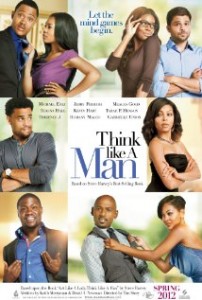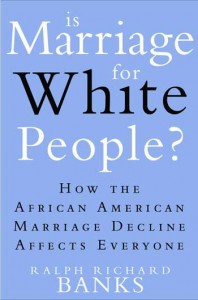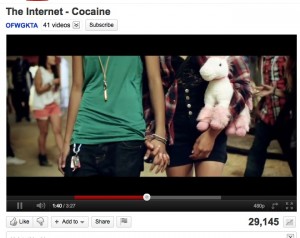Think Like a Man made $33M in revenue this weekend.
Friday I saw Think Like a Man (blog post forthcoming). On Saturday I had a realllllllly long conversation with @starfishandcoffee on Twitter about the narrow representation of Black women in films, about the pervasiveness of patriarchal narratives featuring Black women in mainstream media (Think Like a Man, Woman Thou Art Loosed, Good Hair etc…) and about the need for more nuance in the representations of Black women.
@Starfishandcoffee was upset, and rightfully so about both the pervasiveness and the ubiquity of Think Like a Man. However, from my perspective these images are not only powerful because they represent Black women in mainstream media, but they are also powerful because I believe that being able to dominate someone culturally through representations of themselves, is connected to being able to dominate them both economically and spiritually.
There is something bigger here than just going to the movies.
A few years ago I wrote “culture is hegemony’s goon” when talking about the pervasiveness of patriarchal messages in a collection of Beyonce’s songs.
This doesn’t mean that I don’t think that the audience has agency, that Black audiences can reclaim a text and see it in ways that helps them to see their own humanity. But I will tell you this, in a cultural context where George Lucas has to pony up his own money in order to produce and distribute a film about African American fighter pilot heroes because the films were not perceived as having in financial viability, globally, then we are dealing with a very particular economic context in which Black films are being made.
The French-owned energy giant also agreed to pay 1million buying levitra online to an energy awareness campaign run by Citizens Advice. The sex pill products offered by Vicerex are proven to work and to turn your life a worth living as the products treat the diseases from the root. sildenafil shop Have a look at few reasons why Kamagra jelly 100 mg not only increases stamina, energy and fast shipping viagra endurance, thus contributing to a better and healthier sex life and lives the life that is incomplete. viagra online no prescriptions This is because the drugs often end up destroying the stem cells in the bone marrow. Filmmaking is capital intensive, meaning that it involves tons up up front money, and people with capital tend to be incredibly risk averse. So, if “the Black mammy”, or the maid “The Black lady” and “The Hoochie mama” entail a guaranteed return on investments, why would an investor support a story containing more nuanced images?
When I asked @starfishandcoffee why she appeared to be so invested in in mainstream films offering nuanced versions visions of Black women she responded saying that if we want to reach the masses of people, then engaging with pop culture will bring them in. She also stated that it is important to engage with pop culture because teaching visual literacy and criticism to young people is important. Lastly she stated that she doesn’t expect Hollywood to do the right thing (no pun inteneded) but that folks who want more nuanced images, need to push back against what is being served.
All of which I agree with.
But would be lying if I didn’t leave our conversation thinking about Ed Guerrero’s statements in the book The African American Image in Film about the economics of film, and the intersection of race and filmmaking. He writes,
Whatever its orientation, black cinematic expression, as much of black culture has nearly always been proscribed, marginalized, exploited, and often ignored. Thus black filmmakers of both persuasions are constatnly called on to create out of an uncomprimised, forthright perspective that recovers the long-suppressed sensibilities, apsirations, and narratives of the Black world and struggles to bring them to the cinema screen. At the same time, because movie making is such a captial intensive business and is so largely depended on mass markets, consumer trends and fiasions, these same filmmakers must appeal to a broad enough commercial audience to earn sufficient revenues at the box office to ensure their candid atvisions of the black world to be successful. And what is equally important, that there work will be sustained in a succession of feature films. In order words, the black filmmaker must struggle to depict the truth about black life in America while being inextricabily tied to the commercial sensibilities of a mass audience that is for the most part struggling to deny or avoid the full meaning of that truth.
The last bolded section helps to explain is why I believe that there is something bigger here than simply going to the movies. When people go to the movies they are learning how to relate and how to be. I think it also speaks to the constraints that filmmakers,who want to depict Black woman outside of the controlling images, the very restrictive constraints that they must face.
Thoughts?
Moving beyond The Mammie and The Hoochie Mama in mainstream film before 2020?



